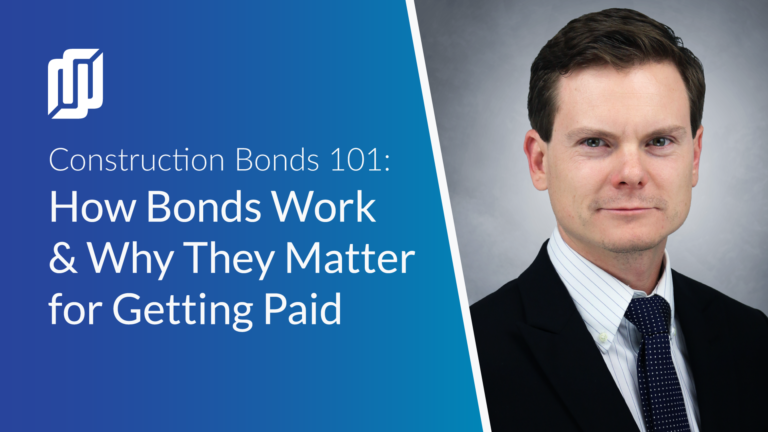As a contractor, you may have been told that you need to get a surety bond. Many licensing organizations require contractor bonds before work begins. However, the process of obtaining a bond in a contractor’s city, county, or state can be confusing.
We partnered with LevelSet for a webinar explaining how contractors can get bonded so they can get paid.
Why do I need a surety bond?
A surety bond is a financial guarantee that ensures that the party (in this case, the contractor) obtaining the bond will perform work in accordance with applicable rules and regulations or be held responsible for fraud or malpractice.
For contractors, surety bonds allow them to operate without tying up capital. Some licensing entities will allow a contractor to put up the full bond amount in cash or collateral in lieu of posting a bond. However, if the bond amount is $20,000, that is money that won’t be accessible to the contractor down the line.
What are the two types of contractor bonds?
Construction Bonds
Constructions bonds are a type of license and permit bond required for professionals in various occupations to be able to legally work in certain areas. Contractors might need a bond for each city, county, or state they perform their work in, depending on the obligee’s specific licensing or permit requirements.
For instance, City A may require a $15,000 bond listing you as a general contractor, while City B might require a $10,000 bond listing you as a general contractor. If you plan to perform work in both of these cities, you would be required to comply with both cities’ bonding requirements.
Contract Bonds
Contract bonds are also known as performance and payment bonds. These bonds guarantee a contract the principal has with the government. These contracts could range from road construction for a city to wiring for a county building.
These bonds are issued on a contract-by-contract basis, guaranteeing the completion of that specific contract only. If another contract requires a surety bond, a second bond must be secured for that contract in particular. Be sure to secure a Request for Proposal (RFP) and a copy of the contract, if available, so you get the right bond.
Questions to ask when you’re told you need a bond
- What type of bond do I need?
- Is this a license requirement?
- Is the bond for a government contract?
- Is there a specific bond form required for my bond?
- What bond amount do I need?
- What trade or license must be listed on the bond?
Why you should work with SuretyBonds.com
When you call SuretyBonds.com, the last thing we want to do is send you back to the obligee. The best way to ensure your bond isn’t delayed is to be thorough with the obligee before submitting a quote application. We welcome you to call our surety experts from the obligee’s office if needed so you can get all your questions answered at once!
Any bond that requires underwriting consideration will require a credit check and the examination of financial documentation. With SuretyBonds.com and ContractorBonds.com, the credit check is a soft review, meaning an applicant’s credit score will not be impacted.
It’s important to know that if the wrong bond is submitted to the obligee, the obligee can reject the bond, causing delays to any projects or businesses relying on the bond to begin work.
Getting bonded is important, but it doesn’t have to be complicated. Call SuretyBonds.com at 1 (800) 308-4358 from 7 AM to 7 PM CST, Monday through Friday, to get your bonding questions answered — and get back to running your construction business.
